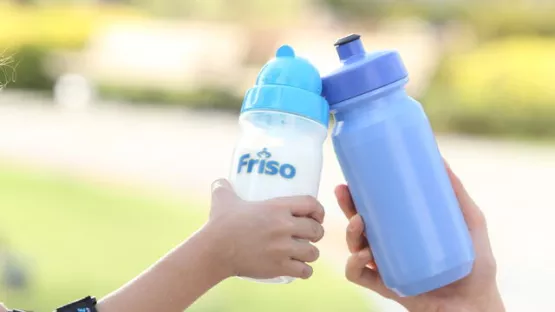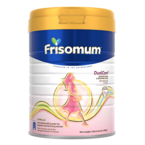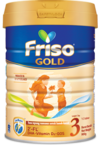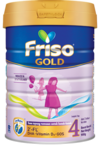Susu formula yang sesuai untuk kanak-kanak mengikut umur
Pelbagai susu tepung dibekalkan untuk kanak-kanak pada umur yang berbe.... read more

As a mom, there's a lot of conflicting information out there about milk formula. We know that you want to give your child the right nutrients that help their development and build their immunity while also being delicious! This guide will give you handy information on what to look for in milk formula, what to avoid and what to be cautious about when choosing formula milk for your child.
The short answer is usually, yes. However, the term "chemicals" is broad. What matters is the kind of chemicals they are, and if they're harmful. For example, DHA is a chemical—a natural fatty acid to be exact—that supports your child's brain structure and function. This chemical is commonly found in the list of formula ingredients because it's beneficial to the child. What you should look out for are harmful chemicals in formula ingredients that can affect your child negatively.
When it comes to selecting the right milk formula for your child, there are certain ingredients that play a huge role in brain development and overall growth. Read to discover the must-have ingredients in the formula milk you choose for your loved one, including the likes of prebiotics, probiotics and more.
As previously mentioned, DHA is one of the beneficial long-chain polyunsaturated fatty acids that are crucial for the growth and development of your child's brain and retina.
Another fatty acid, ARA is critical for the growth and development of your child's body, brain and health.1
These are types of fibre that your child cannot digest, but their gut bacteria can. Prebiotics help boost their immune system and promote better digestion, so make sure to choose a formula milk with prebiotics for your little one.
Probiotics is one of the most important formula milk ingredients out there. These are live bacteria and yeasts that are good for your child and their digestive system. Probiotics i.e G.O.S, Bifido Lactis, etc also help their immune system develop, and lower the chances of gastro-intestinal tract infections.
Calcium helps with bone growth and strength, and the calcium found in quality formula milk is made to be easily absorbed by your child’s body.
Milk proteins are formula milk ingredients that can be divided into 2 groups: caseins—which are insoluble milk proteins—and whey proteins, which are soluble. Casein helps with the absorption of minerals, and whey protein is great for growing and building your child’s muscles. Whey protein’s amino acid profile may stimulate the muscle building process more than casein18. Casein peptides also bind to and carry minerals like calcium and phosphorus, improving their digestibility in your stomach18.
Also known as α-Lactalbumin or α-La, this protein can be found in selected growing-up formulas. It helps with the absorption of essential minerals, and it provides a well-balanced supply of essential amino acids for your child2, which is why it is one of the core ingredients found in formula milk.2
Now you know what milk formula ingredients to look for and avoid before you make a purchase! If you're currently formula-feeding your child and need to switch them over, take a look at our How to Switch Milk Formula article for some great tips that'll help make the transition as easy as possible.
If you are considering switching your milk formula but aren’t sure which one to select, look no further than our selection of formula milk with key nutrients such as prebiotics and more: Friso® Gold 3 and Friso® Gold 4 with Novas Signature Milk with LocNutri™ Technology.
Friso® Gold 3 is specially designed for children aged 1 to 3. It contains easy-to-digest nutrients that will allow them to experience life at its fullest from the get-go:
DHA, AA, Omega 3&6 - To fuel learning & mental growth. DHA is important for optimal visual and cognitive development7. AA is recognised for its key role for optimal health, cognition and development during foetal and early postnatal life8. Omega 3 and 6 fatty acids are important for normal development of the brain, nervous system, sensory organs and intelligence9.
Calcium, Protein, Vitamin & Minerals - Muscle and bone growth. Calcium helps in the normal growth and development of bones and teeth. Protein is essential for your child’s growth, maintenance and repair for the body10. Vitamins and minerals are vital for growth and metabolism11.
GOS, Nucleotides & Bifido Lactis - Helps absorb key nutrients & build strong immune systems. GOS are prebiotics that can help with constipation and more12. Nucleotides can promote healthy gastrointestinal and immunological growth in young children13. Bifido Lactis is important for diarrhoea prevention as well as immune and gut maturation14.
Specially designed for children aged 3 and above, Friso® Gold 4 is the right choice of nutrition support for your young child.
DHA, AA, Omega 3&6 - To fuel learning & mental growth. DHA is important for optimal visual and cognitive development7. AA is recognised for its key role for optimal health, cognition and development during foetal and early postnatal life8. Omega 3 and 6 fatty acids are important for normal development of the brain, nervous system, sensory organs and intelligence9.
Upsize of Nutrients - Calcium, Protein, Iron, Copper, Vitamin A and K1 - These nutrients give rapid growth of muscle and bone, as well as healthy vision to prepare the body for study as children of 4 years old begin their preschool education. Calcium helps in the normal growth and development of bones and teeth. Protein is essential for your child’s growth, maintenance and repair for the body10. When copper is combined with iron, it allows the body to build red blood cells as well as maintain healthy bones, blood vessels, nerves, and immune system15. Vitamin A enhances vision and immune functions16. Vitamin K1 helps make other proteins in the body that are important for blood, bone and kidney health and can be found in dark, leafy green vegetables17.
GOS, Nucleotides & Bifido Lactis - Helps absorb key nutrients & build strong immune systems. GOS are prebiotics that can help with constipation and more12. Nucleotides can promote healthy gastrointestinal and immunological growth in young children13. Bifido Lactis is important for diarrhoea prevention as well as immune and gut maturation14.
For more information, you can also call the Friso® Gold Care Line at 1800-81-3854 for support, available every Monday to Friday, from 8.30am to 4.30pm.


